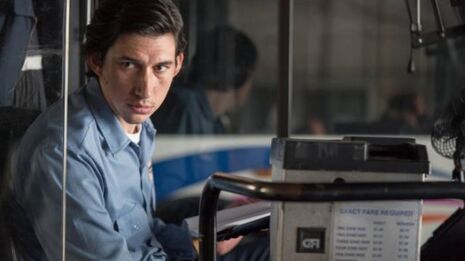Paean to the Poet: Jim Jarmusch’s Paterson
In committing to the mundane, Jarmusch reveals the poetic beauty of the everyday

Paterson is a film in which remarkably little actually happens. We follow one week in the life of Paterson (Adam Driver), a bus driver living in a small, post-industrial city also named Paterson (no relation). He follows a similar routine each day: he goes to work, writes poems on his lunch break, drinks a single beer at the same bar in the evening, and has dinner with his partner Laura (Golshifteh Farahani).
It is this very ordinariness which unexpectedly moves the viewer, showing us the power and the strangeness of the everyday. Director Jim Jarmusch creates a dreamlike landscape out of this New Jersey town. Rather than focusing on industrial decline, high unemployment rates or ‘white flight’, he underlines the beauty and appeal of the place, making it difficult – talk of smartphones aside – to know which decade we are in. It is populated with a surreal cast of characters, from the pairs of twins who continually pop up to the Japanese tourist who shares Paterson’s love of William Carlos Williams and Frank O’Hara.
“It is this very ordinariness which unexpectedly moves the viewer, showing us the power and the strangeness of the everyday”
It is a film about poetry, which makes you want to read it and to write it. When poetry is considered in cinema, it is generally in biopic mode, from Bright Star to Sylvia. Here, there is no ‘big break’ when the world suddenly realises the brilliance of Paterson’s work. Equally, it is not a tale of a tortured almost-artist, like the Coen brothers’ Inside Llewyn Davis. Paterson writes poetry for himself, and to speak his love for Laura. He gets his affirmation from within, and from her enthusiasm; he isn’t seeking shares, likes, or sales, and there is something refreshing about this lack of cynicism or self-promotion. His creativity is its own end, and it enriches his life.
Paterson’s poems are simple but affecting, and stayed in my mind for days after viewing (all credit to real-life poet Ron Padgett, apparently). They appear hesitantly, at the point of composition, unfolding on the screen as they do on the page. Mirroring the film itself, they encourage us to look more closely and more appreciatively at our lives, from the box of matches on the kitchen counter to the bubbles bursting in an after-work beer. Their straightforward style can create moments of real emotional force, as when Paterson writes that ‘If you ever left me I’d tear my heart out and never put it back’.
Paterson’s love for Laura is, along with his poems, the defining fact of his life. Where most romantic films show the getting together or the falling apart, Jarmusch unusually focuses on the happy long term. Each day begins with a birds-eye shot of the lovers in bed, exchanging sleepy words and kisses as Paterson leaves for work. Laura has her own creative pursuits, including cupcakes and country singing, and, like Paterson, seems entirely content with her lot. Yet it is Driver, ultimately, who persuades the viewer to follow him. It is a film to savour: slow, sweet, and strangely innocent.
 News / Uni Scout and Guide Club affirms trans inclusion 12 December 2025
News / Uni Scout and Guide Club affirms trans inclusion 12 December 2025 News / Pembroke to convert listed office building into accom9 December 2025
News / Pembroke to convert listed office building into accom9 December 2025 Features / Searching for community in queer Cambridge10 December 2025
Features / Searching for community in queer Cambridge10 December 2025 News / Uni redundancy consultation ‘falls short of legal duties’, unions say6 December 2025
News / Uni redundancy consultation ‘falls short of legal duties’, unions say6 December 2025 News / Gov declares £31m bus investment for Cambridge8 December 2025
News / Gov declares £31m bus investment for Cambridge8 December 2025








